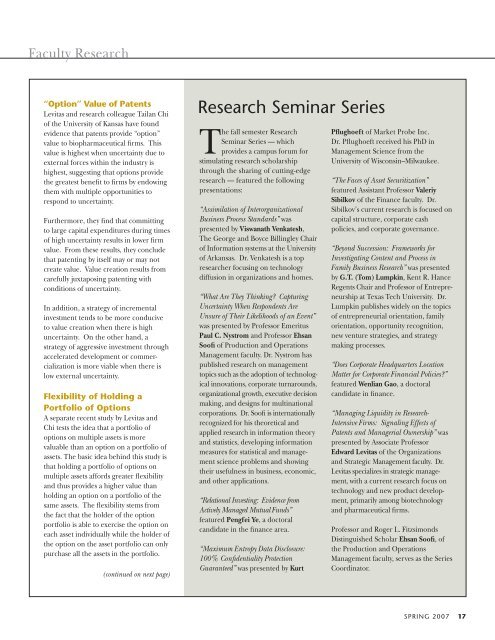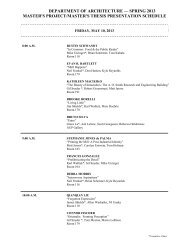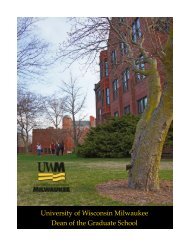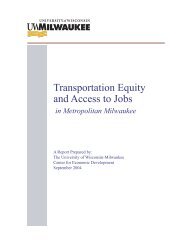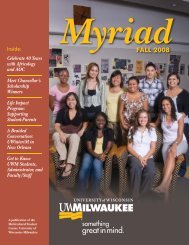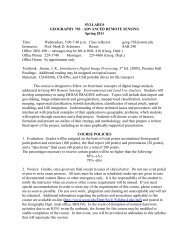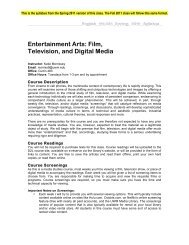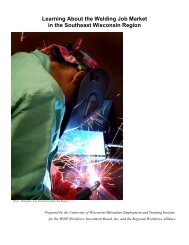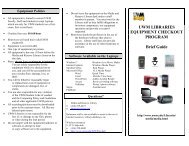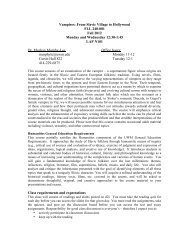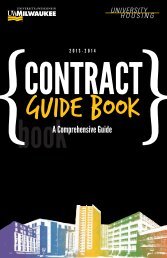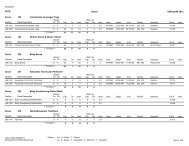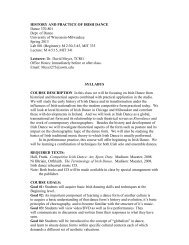Inside: - UW-Milwaukee
Inside: - UW-Milwaukee
Inside: - UW-Milwaukee
You also want an ePaper? Increase the reach of your titles
YUMPU automatically turns print PDFs into web optimized ePapers that Google loves.
Faculty Research<br />
“Option” Value of Patents<br />
Levitas and research colleague Tailan Chi<br />
of the University of Kansas have found<br />
evidence that patents provide “option”<br />
value to biopharmaceutical fi rms. This<br />
value is highest when uncertainty due to<br />
external forces within the industry is<br />
highest, suggesting that options provide<br />
the greatest benefi t to fi rms by endowing<br />
them with multiple opportunities to<br />
respond to uncertainty.<br />
Furthermore, they fi nd that committing<br />
to large capital expenditures during times<br />
of high uncertainty results in lower fi rm<br />
value. From these results, they conclude<br />
that patenting by itself may or may not<br />
create value. Value creation results from<br />
carefully juxtaposing patenting with<br />
conditions of uncertainty.<br />
In addition, a strategy of incremental<br />
investment tends to be more conducive<br />
to value creation when there is high<br />
uncertainty. On the other hand, a<br />
strategy of aggressive investment through<br />
accelerated development or commercialization<br />
is more viable when there is<br />
low external uncertainty.<br />
Flexibility of Holding a<br />
Portfolio of Options<br />
A separate recent study by Levitas and<br />
Chi tests the idea that a portfolio of<br />
options on multiple assets is more<br />
valuable than an option on a portfolio of<br />
assets. The basic idea behind this study is<br />
that holding a portfolio of options on<br />
multiple assets affords greater fl exibility<br />
and thus provides a higher value than<br />
holding an option on a portfolio of the<br />
same assets. The fl exibility stems from<br />
the fact that the holder of the option<br />
portfolio is able to exercise the option on<br />
each asset individually while the holder of<br />
the option on the asset portfolio can only<br />
purchase all the assets in the portfolio.<br />
(continued on next page)<br />
Research Seminar Series<br />
The fall semester Research<br />
Seminar Series — which<br />
provides a campus forum for<br />
stimulating research scholarship<br />
through the sharing of cutting-edge<br />
research — featured the following<br />
presentations:<br />
“Assimilation of Interorganizational<br />
Business Process Standards” was<br />
presented by Viswanath Venkatesh,<br />
The George and Boyce Billingley Chair<br />
of Information systems at the University<br />
of Arkansas. Dr. Venkatesh is a top<br />
researcher focusing on technology<br />
diffusion in organizations and homes.<br />
“What Are They Thinking? Capturing<br />
Uncertainty When Respondents Are<br />
Unsure of Their Likelihoods of an Event”<br />
was presented by Professor Emeritus<br />
Paul C. Nystrom and Professor Ehsan<br />
Soofi of Production and Operations<br />
Management faculty. Dr. Nystrom has<br />
published research on management<br />
topics such as the adoption of tech no logical<br />
innovations, corporate turnarounds,<br />
organizational growth, executive decision<br />
making, and designs for multinational<br />
corporations. Dr. Soofi is internationally<br />
recognized for his theoretical and<br />
applied research in information theory<br />
and statistics, developing information<br />
measures for statistical and management<br />
science problems and showing<br />
their usefulness in business, economic,<br />
and other applications.<br />
“Relational Investing: Evidence from<br />
Actively Managed Mutual Funds”<br />
featured Pengfei Ye, a doctoral<br />
candidate in the fi nance area.<br />
“Maximum Entropy Data Disclosure:<br />
100% Confi dentiality Protection<br />
Guaranteed” was presented by Kurt<br />
Pfl ughoeft of Market Probe Inc.<br />
Dr. Pfl ughoeft received his PhD in<br />
Management Science from the<br />
University of Wisconsin–<strong>Milwaukee</strong>.<br />
“The Faces of Asset Securitization”<br />
featured Assistant Professor Valeriy<br />
Sibilkov of the Finance faculty. Dr.<br />
Sibilkov’s current research is focused on<br />
capital structure, corporate cash<br />
policies, and corporate governance.<br />
“Beyond Succession: Frameworks for<br />
Investigating Content and Process in<br />
Family Business Research” was presented<br />
by G.T. (Tom) Lumpkin, Kent R. Hance<br />
Regents Chair and Professor of Entrepreneurship<br />
at Texas Tech University. Dr.<br />
Lumpkin publishes widely on the topics<br />
of entrepreneurial orientation, family<br />
orientation, opportunity recognition,<br />
new venture strategies, and strategy<br />
making processes.<br />
“Does Corporate Headquarters Location<br />
Matter for Corporate Financial Policies?”<br />
featured Wenlian Gao, a doctoral<br />
candidate in fi nance.<br />
“Managing Liquidity in Research-<br />
Intensive Firms: Signaling Effects of<br />
Patents and Managerial Ownership” was<br />
presented by Associate Professor<br />
Edward Levitas of the Organizations<br />
and Strategic Management faculty. Dr.<br />
Levitas specializes in strategic management,<br />
with a current research focus on<br />
technology and new product development,<br />
primarily among biotechnology<br />
and pharmaceutical fi rms.<br />
Professor and Roger L. Fitzsimonds<br />
Distinguished Scholar Ehsan Soofi , of<br />
the Production and Operations<br />
Management faculty, serves as the Series<br />
Coordinator.<br />
SPRING 2007 17


